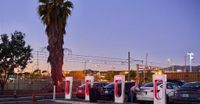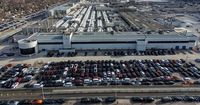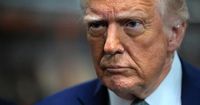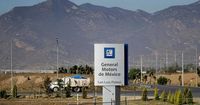In a bold move that has stirred significant backlash from global leaders and economists alike, U.S. President Donald Trump announced a 25% tariff on imported cars and auto parts during a press briefing on March 26, 2025. The tariffs, set to take effect on April 2, are aimed at bolstering domestic manufacturing and reducing reliance on foreign automotive imports.
Trump, speaking from the Oval Office, asserted that this initiative would "spur growth like you haven't seen before," claiming it could generate between $600 billion and $1 trillion in revenue for the U.S. over the next two years. However, critics argue that such tariffs could have dire consequences for the global economy, particularly as they come at a time when the automotive industry is just beginning to recover from pandemic-related disruptions.
World leaders quickly condemned the announcement, with European Commission President Ursula von der Leyen expressing her dismay, stating, "I deeply regret the U.S. decision to impose tariffs on EU automotive exports." Meanwhile, Japanese Prime Minister Shigeru Ishiba questioned the rationale behind uniform tariffs, given Japan's substantial investments in the U.S. automotive sector.
Back home, the United Auto Workers (UAW) union applauded Trump's decision, framing it as a necessary step towards ending what they termed the "disaster" of free trade agreements. UAW President Shawn Fain stated, "We applaud the Trump administration for stepping up to end the free trade disaster that has devastated working-class communities for decades. These tariffs are a major step in the right direction for autoworkers and blue-collar communities across the country." Fain believes that the new tariffs could help revitalize the U.S. auto industry by bringing jobs back to American communities.
However, the tariffs are expected to lead to significant price increases for consumers. Rella Suskin, an equity analyst at Morningstar, noted in a research report that car prices are "likely to rise significantly" as a direct result of the new duties. Analysts from Goldman Sachs estimated that the tariffs could inflate sticker prices by anywhere from $5,000 to $15,000 for imported vehicles and by $3,000 to $8,000 for domestically produced ones.
Shares of major U.S. automakers reacted negatively to the announcement. General Motors (GM) saw its stock plummet over 7%, reflecting investor concerns about the company's heavy reliance on imports from Mexico and Canada. Ford's shares also dipped, while Tesla's stock rose slightly, as the company is less exposed to the tariffs due to its domestic manufacturing footprint.
Industry experts are wary of the potential long-term impacts of these tariffs on the automotive market. Cox Automotive chief economist Jonathan Smoke warned that the tariffs would be "highly disruptive" to North American vehicle production, predicting tighter supply and higher prices across the board. He stated, "By mid-April, we expect disruptions. We expect sales to fall, new and used prices to increase, and some models to be eliminated if those tariffs persist."
Despite the backlash, Trump's administration remains steadfast in its commitment to the tariffs, viewing them as a means to protect American jobs and stimulate domestic production. White House staff secretary Will Scharf echoed this sentiment, offering a more conservative revenue estimate of around $100 billion from the new tariffs.
The potential fallout from these tariffs extends beyond just car prices. Analysts warn that they could disrupt supply chains and deter investments, particularly as many automakers rely on integrated international supply chains. The National Foreign Trade Council cautioned that placing tariffs on imports of autos risks damaging the competitiveness and export readiness of an industry that relies heavily on these global networks.
As the automotive industry braces for the impact of these tariffs, the question remains whether they will lead to the desired outcome of increased domestic production and job creation. While some industry leaders, such as Matt Blunt, president of the American Automotive Policy Council, expressed commitment to working with the administration on policies that support American workers, others, like Ford CEO Jim Farley, have voiced concerns that such tariffs could be "devastating" and "blow a hole in the U.S. industry that we've never seen."
In the meantime, consumers are advised to prepare for rising costs associated with purchasing and maintaining vehicles. With the average transaction price for a new vehicle already exceeding $48,000, the added financial burden of tariffs could make car ownership increasingly untenable for many American families.
The tariffs have also sparked fears of retaliation from affected countries. Canadian and Mexican officials have indicated that they may respond with their own tariffs, further escalating tensions in international trade relations. Ontario Premier Doug Ford stated, “I fully support the federal government preparing retaliatory tariffs to show that we’ll never back down.”
As the situation develops, the automotive industry and consumers alike will be watching closely to see how these tariffs will reshape the market landscape. With significant investments at stake and the livelihoods of countless workers on the line, the stakes have never been higher.









